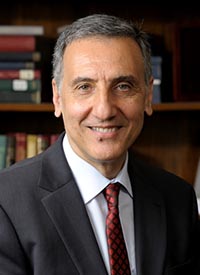
A Tale of Two Systems: Academe and Industry
Amr Elnashai, FREng
The Harold and Inge Marcus Dean of Engineering, College of Engineering
Pennsylvania State University, U.S.A.
Abstract: Academic institutions are the primary engine of intellectual advancement and economic development. Engaged in education, research and service to the technical community and civil society, universities have pressing financial needs, and are therefore also engaged in fund-raising and fiscal optimization. The business models of academe are not just exceptionally complex but also poorly understood and documented. On the other hand, industrial organizations while being in a much more competitive life-or-death ecosystem, have a clear business model that defines inputs and outputs. The literature has an abundance, even an over-supply, of business models, while the same is not true for academic institutions. We will discuss the question of whether excellence in learning, discovery and engagement can be achieved in the absence of robust business practices and strong academic leadership. We will also talk about the future of engineering education, research and service, and the requirements that success imposes on the business functions of academic institutions, as well as the features of institutions that are likely to thrive in the modern world.
Bio: Fellow of the British Royal Academy of Engineering, Dr. Amr Elnashai is the Dean of Engineering at the Pennsylvania State University, and the Harold and Inge Marcus Chair of Engineering. He was previously head of the Department of Civil and Environmental Engineering at the University of Illinois at Urbana-Champaign, USA and the Bill and Elaine Hall endowed professor in the same department. He was Director of the NSF multi-institution interdisciplinary Mid-America Earthquake Center (2004-2009). He was also Director of the NSF Network for Earthquake Engineering Simulations (NEES) Laboratory at Illinois (2002-2009). Amr obtained his Bachelor of Science degree from Cairo University, followed by M.Sc. and Ph.D. degrees from Imperial College, University of London. Before joining the University of Illinois in June 2001, Amr was Professor of Earthquake Engineering and Head of Division at Imperial College (1985-2001). He has been Visiting Professor at the University of Surrey, UK, since 1997. Other visiting professor appointments include the University of Tokyo, the University of Southern California, and the European School for Advanced Studies in Reduction of Seismic Risk, Italy.
He is founder, copyright holder and co-editor of the Journal of Earthquake Engineering and editorial board member of several other journals, a member of the drafting panel of the European design codes, past chair of the UK earthquake engineering association, UK delegate to and past senior Vice-President of the European Association of Earthquake Engineering and a member of the Council of the UK Institution of Structural Engineers. He is the winner of the Imperial College Unwin Prize for the best PhD thesis in Civil and Mechanical Engineering (1984), the Oscar Faber Medal for best paper in the Institution of Structural Engineering, and two best paper medals from the International Association of Tall Buildings, Los Angeles.
Dr. Elnashai's technical interests are multi-resolution distributed analytical simulations, network analysis, large-scale hybrid testing and field investigations of the response of complex networks and structures to earthquakes. He has produced more than 250 research publications, comprising over 140 refereed journal papers and many conference papers, keynote and prestige lectures (including the Nathan Newmark Distinguished Lecture), research reports, 3 books and several book chapters, magazine articles and earthquake field investigation reports. Amr has supervised 45 Doctoral and over 100 Master of Science theses. Many of his students hold significant positions in industry, academia and government in over 14 countries.
Back to Speakers